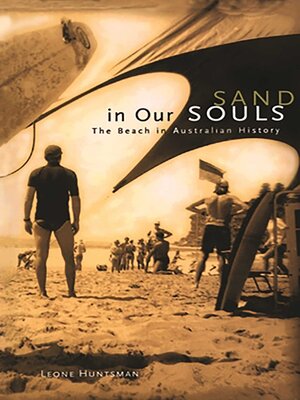
Sign up to save your library
With an OverDrive account, you can save your favorite libraries for at-a-glance information about availability. Find out more about OverDrive accounts.
Find this title in Libby, the library reading app by OverDrive.



Search for a digital library with this title
Title found at these libraries:
| Library Name | Distance |
|---|---|
| Loading... |
Images of 'the beach' pervade Australian popular culture. However the deeper significance of the experience of 'the beach', and its influence on Australian culture generally, have not yet been seriously explored. How, why and when did the beach become part of the Australian way of life?
In Sand in our Souls Leone Huntsman describes the forces and pressures that encouraged or impeded Australians' enjoyment of sand and surf, from early enjoyment of bathing, through nearly a century of repressive restrictions, to freedom won in the face of drawn-out opposition. The ways in which artists, writers, film-makers and the advertising industry have depicted the beach are examined for the light they throw on the beach's significance. She traces the development of a distinctively Australian way-of-being-at-the-beach, suggesting that the beach experience has been absorbed into our emerging culture and continues to shape it in subtle ways.
Huntsman's provocative arguments will stimulate debate on the concept of 'national identity' appropriate for a new Australian century, and promote a deeper understanding of an aspect of life in Australia that is cherished by many of those who live here.
In Sand in our Souls Leone Huntsman describes the forces and pressures that encouraged or impeded Australians' enjoyment of sand and surf, from early enjoyment of bathing, through nearly a century of repressive restrictions, to freedom won in the face of drawn-out opposition. The ways in which artists, writers, film-makers and the advertising industry have depicted the beach are examined for the light they throw on the beach's significance. She traces the development of a distinctively Australian way-of-being-at-the-beach, suggesting that the beach experience has been absorbed into our emerging culture and continues to shape it in subtle ways.
Huntsman's provocative arguments will stimulate debate on the concept of 'national identity' appropriate for a new Australian century, and promote a deeper understanding of an aspect of life in Australia that is cherished by many of those who live here.







